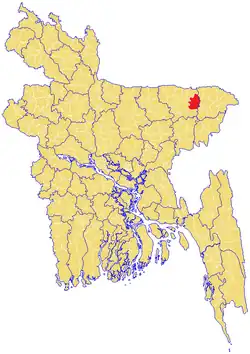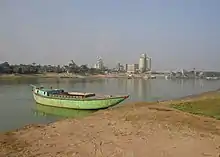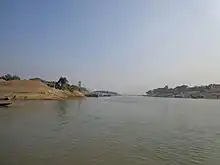Chhatak Upazila
Chhatak (Bengali: ছাতক) is an upazila of the Sunamganj District, located in the northeastern Sylhet Division of Bangladesh. It is named after its headquarters, the town of Chhatak, which is an important industrial centre in the division.[1] Although it is currently part of the Sunamganj District, Chhatak is more closely related to Sylhet District for social, cultural, commercial and transport reasons.
Chhatak
ছাতক | |
|---|---|
 | |
| Division | Sylhet Division |
| District | Sunamganj |
| Government | |
| • Upazila Chairman | Muhammad Fazlur Rahman |
| • MP (Sunamganj-5) | Muhibur Rahman Manik |
| Area | |
| • Total | 434.76 km2 (167.86 sq mi) |
| Population | |
| • Total | 273,153 |
| • Density | 628/km2 (1,630/sq mi) |
| Demonym | Chhataki |
| Time zone | UTC+6 (BST) |
| Postal code | 3080-93 |
| Website | chhatak |
Etymology
According to the majority of researchers including Dewan Mohammad Azraf, the area got its name from chhātā, the Bengali word for umbrella. It is said that upon the founding of a haat bazaar in such a rain-prone area, shopkeepers and shoppers would arrive with umbrellas and use umbrellas to prevent rain from falling on their fruits and crops. The area would be filled with umbrellas which later caused the market to be known as Chhātār Bazār (Umbrella's Market). Over time, it became corrupted into Chhātak Bazār. On the other hand, Monir Uddin Chowdhury asserted that Chhātak was actually corrupted from Chhatrāk, the word for an umbrella holder. He added that the area was first settled by a group of Chhatrāks who used to serve the local ruler.[2]
History
After the Conquest of Srihatta in 1303, some disciples of Shah Jalal migrated and settled in present-day Chhatak where they preached Islam to the local people. Syed Yusuf of Iraq migrated to a village in Singchapor pargana which came to be known as Syedergaon (The Syed's village) and continue to be the residence of his descendants.
In 1788, Ganga Singha initiated a rebellion in Chhatak against the British East India Company. Company soldiers managed to capture Singha, who later committed suicide by drowning himself in a river. A thana was founded in Chhatak in 1908, during the British Raj period. During the Bangladesh Liberation War of 1971, Bengali freedom fighters in Chhatak immersed themselves in a brawl on 28 April, leading to the death of 13 freedom fighters with 11 being wounded. Hader Tila and Durbin Tila were also battlegrounds during the war. In memory of Chhatak's contribution, the Chhatak Central Memorial Monument as well as the Seventeen Flames in Madhabpur were established following the war. In 1976, Chhatak was divided into three thanas; Chhatak, Dowarabazar and Companiganj. In 1980, the Jalalia Alim Madrasa was founded in Chhatak which developed local Islamic education.[1] Three years later, Chhatak Thana was upgraded to an upazila (sub-district) as part of the President of Bangladesh Hussain Muhammad Ershad's decentralisation programme. A movement emerged among the people of Chhatak to transfer the upazila to Sylhet for cultural, social, commercial and transport reasons. As a result, the demand reached the Committee for Administrative Reorganisation but was not implemented for various reasons. From 1984, a movement demanding the creation of Chhatak District emerged; which would consist of Chhatak, Dowarabazar, Companiganj and the proposed upazilas of Jauwabazar and Jahidpur (South Chhatak). The movement gained the support of Chhataki politicians such as Shamsu Miah Chowdhury (MPA), Idris Ali Bir Pratik (Chairman of Dowarabazar) and Madaris Ali (Chairman of Companiganj). In 2020, a group of Chhataki lawyers submitted a memorandum to Muhammad Mashiur Rahman NDC, the Sylhet Divisional Commissioner, demanding the establishment of Chhatak District.[3]
Geography


Chhatak is located at 25.0417°N 91.6750°E. It has 43,727 households and a total area 434.76 km2.
Demographics
At the time of the 1991 Bangladesh census, Chhatak had a population of 273,153. Males constituted 51.05% of the population and females 48.95%. The adult (18+) population was 135,445.[4] Religious affiliation was: Muslim 83.08%, Hindu 16.75%, Buddhist, Christian and others 0.17%.
Administration
Chhatak Upazila is divided into Chhatak Municipality and 13 union parishads: Bhatgaon, Chhaila Afjalabad, Chhatak, Chormoholla, Dolarbazar, Gobindganj-Syedergaon, Islampur, Jauwa Bazar, Kalaruka, Khurma Dakshin, Khurma Uttar, Noarai, and Singchapair. The union parishads are subdivided into 287 mauzas and 539 villages.[5]
Chhatak Municipality is subdivided into 9 wards and 23 mahallas.[5]
Municipality
The Upazila Municipality consists of 9 wards:
- Ward 1:
- Ward 2:
- Ward 3:
- Ward 4:
- Ward 5:
- Ward 6:
- Ward 7:
- Ward 8:
- Ward 9:
Chairmen
| Name | From | Date |
|---|---|---|
| Alhaj Sujan Mian Chowdhury | Chhatak Bazar | |
| Mohibur Rahman Manik | Mandalibhog | |
| Mizanur Rahman Chowdhury | Bhatgaon | 2008-2013 |
| Waliur Rahman Chowdhury Bakul | Gobindaganj-Syedergaon | 2014-2019 |
| Muhammad Fazlur Rahman | Monirgati | Present |
Education
Chhatak has an average literacy rate of 24.5% (7+ years) compared with the national average of 32.4%.[4]
| Name | Headteacher/Principal |
|---|---|
| Buraiya Kamil Madrasa | Muhammad Sirajul Islam |
| Chhatak Jalalia Fazil Madrasa | Muhammad Abdul Ahad |
| Gobindanagar Fazalia Fazil Madrasa | AT Muhammad Abdus Salam |
| Singchapoir Alim Madrasa | Muhammad Abdul Hadi |
| Palpur Jalalia Alim Madrasa | Abu Bakr Siddiq |
| Kharidichar Senior Alim Madrasa | Aftabuddin Muhammad Al-Faruq |
| Kalaruka Dakhil Madrasa | Muhammad Mahbubur Rahman |
| Bangaon Islamia Dakhil Madrasa | Muhammad Sirajul Islam |
| Natunbazar Dakhil Madrasa | Muhammad Shamsun Nur |
| Razzaqia Islamia Dakhil Madrasa | Muhammad Mushahid Ali |
| Nurullahpur Dakhil Madrasa | Muhammad Jahangir Alam |
| Lakeshwar Dakhil Madrasa | Muhammad Azizur Rahman |
| Sylhet Pulp and Pepper Mills Dakhil Madrasa | Muhammad Shariful Islam |
| Dolarbazar Islamia Dakhil Madrasa | Muhammad Junayd Ahmad |
| Kumarkandi Islamia Dakhil Madrasa | Muhammad Mahmudur Rahman |
| Gabur Gaon Darul Quran Dakhil Madrasa | Muhammad Qamruzzaman |
| Dighli Rahmania Womens Dakhil Madrasa | Muhammad Zahur Ali |
| Radhanagar Muhammadia Dakhil Madrasa | Muhammad Shamsul Kabir Misbah Chowdhury |
| Al-Ikhwan Girls Dakhil Madrasa | Muhammad Shamsul Islam |
| Bandargaon Islamia Dakhil Madrasa | Muhammad Abdul Qayyum |
| Shah Sufi Muzzammil Ali Dakhil Madrasa | Muhammad Abdus Salam |
| Muhammadia Hafizia Dakhil Madrasa | Waisur Rahman |
| Jamia Muhammadia Muktirgaon Dakhil Madrasa | Muhammad Makhsusur Rahman |
Notable people
- Abdul Hoque, freedom fighter and politician
- Abul Hasnat Md. Abdul Hai, former parliamentarian
- Kalim Uddin Ahmed, BNP politician
- Mohibur Rahman Manik, Awami League politician
- Durbin Shah, mystical poet and songwriter
See also
References
- Ashfaq Hossain (2012). "Chhatak Upazila". In Sirajul Islam; Miah, Sajahan; Khanam, Mahfuza; Ahmed, Sabbir (eds.). Banglapedia: the National Encyclopedia of Bangladesh (Online ed.). Dhaka, Bangladesh: Banglapedia Trust, Asiatic Society of Bangladesh. ISBN 984-32-0576-6. OCLC 52727562. OL 30677644M. Retrieved 25 October 2023.
- উপজেলার পটভূমি. Chhatak Upazela (in Bengali).
- Noman, Jahangir (26 July 2021). ছাতক জেলা বাস্তবায়ন কেন জরুরি. Sylhet Today 24 (in Bengali).
- "Population Census Wing, BBS". Archived from the original on 27 March 2005. Retrieved November 10, 2006.
- "District Statistics 2011: Sunamganj" (PDF). Bangladesh Bureau of Statistics. Archived from the original (PDF) on 13 November 2014. Retrieved 14 July 2014.
- মাদ্রাসা [Madrasha]. Satokh Ufozela (in Bengali).
